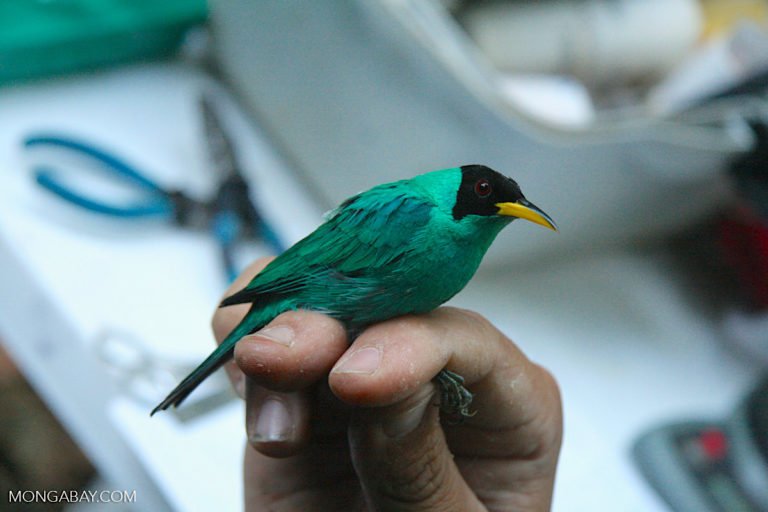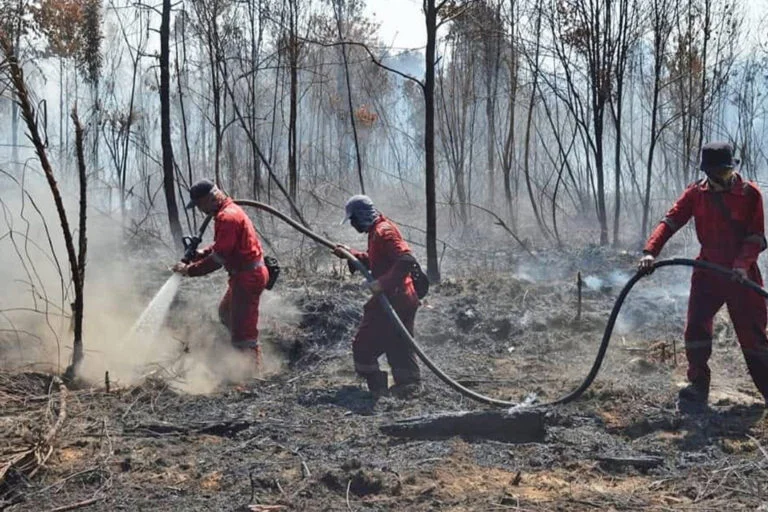- Despite sanctions imposed following the February 2021 coup, Myanmar exported more than $190 million worth of timber, including to countries that have sanctions on the country’s state-controlled timber monopoly, according to a new report from Forest Trends.
- The continued trade highlights the challenges of effectively enforcing sanctions, the report authors say; a lack of reporting on the timber trade from within the country also emphasizes the military regime’s purposeful lack of transparency.
- The authors call on countries to do more to cut off the junta’s access to natural resource revenues by extending financial sanctions to the banking sector.
- According to the report, effective implementation of sanctions is one of the most important actions the international community can take to support the citizens of Myanmar.
Myanmar’s military-led regime exported more than $190 million worth of timber in 2021, including to countries with active sanctions on the country’s state-controlled timber monopoly, according to a recent report from Forest Trends.
Following the February 2021 coup and violent crackdowns on citizens, Canada, the European Union, Switzerland, the United Kingdom, and the United States all placed sanctions on junta leaders and military-run enterprises from sectors such as mining, forestry, and oil and gas in an effort to curb the regime’s access to natural resource revenues.
The Forest Trends report investigates the impact of sanctions imposed on the Myanma Timber Enterprise (MTE), the state-owned timber monopoly for Myanmar’s forestry sector. MTE regulates all harvesting and sales of timber in the country and draws a percentage of export revenue, thereby representing a key source of income for the military regime.
Given that MTE is the only source of legal timber in Myanmar, the report authors say that sanctions on the company effectively represent a ban on any trade in Myanmar timber. The report also highlights the legal risks to entities continuing to import timber from Myanmar and calls on countries to do more to cut off the junta’s access to natural resource revenues.
Experts are particularly concerned that poorly enforced sanctions could leave the door open to illegal logging, cronyism and siphoning of public funds, as seen during previous periods of military rule.
“If sanctions are ineffective at reducing the timber trade, then the opportunity for the junta to use the forestry sector as a means of capturing revenue increases dramatically,” the report says. “This is especially true if anti-corruption reforms introduced prior to the coup are reversed. In the past, Myanmar lost billions of dollars from the forestry sector due to corruption, mismanagement, and other illicit activities.”
Unclear timber origins
According to the report, $37 million of Myanmar’s total $190 million in timber exports reported between February and November 2021 went to jurisdictions with active sanctions on MTE. This included $22 million to EU member states, with Austria, Belgium, France, the Netherlands and Poland increasing their imports relative to the previous year. In the U.S., where imports were mainly sawn teak (Tectona grandis) for use in luxury yachts, the overall number of importing companies dropped by two-thirds, yet total trade still increased slightly.
Meanwhile, the remaining $154 million was imported by countries that have not imposed sanctions, including India, Thailand and China, where imports increased by 35%, or $29 million, relative to the previous year.
The report corroborates prior research by advocacy group Justice for Myanmar, which documented the failure of sanctions to stem the flow of timber into the U.S. According to the JFM report, U.S. firms imported nearly 1,600 metric tons of teak from Myanmar in 82 shipments between February and November 2021. Companies circumvented sanctions by buying timber from private brokers, instead of directly from MTE, the report added. Brokers reportedly secure their supply via MTE auctions, then export the timber either directly or via intermediate countries like China.
With MTE under military control, Myanmar’s timber auctions have become more opaque, making it difficult to trace the trade and take action on sanction violations. The military regime has not publicly disclosed the revenues generated from timber sales since the coup, but the International Tropical Timber Organization (ITTO) reported that MTE has held five timber auctions since February 2021, which generated more than $8.1 million. However, according to the ITTO, none of that wood was auctioned as export grade.
“Myanmar’s Central Statistics Organization (CSO) reports about $65 million in forestry exports over that same time,” Kerstin Canby, senior director of Forest Trends’ forest policy, trade, and finance initiative, told Mongabay in an email. “But given that importing countries reported $190 million in trade — more than half by China — this suggests that the bulk of the trade is illegal, or at least unreported by the CSO.”
Canby added that the junta does not report the provenance of any traded timber, so it remains unclear whether the exported timber came from government stockpiles held before the coup, from seizures made by the junta, or from newly harvested wood.

Extend financial sanctions
The continued trade highlights the challenges of effective sanction enforcement. Timber regulations, such as the U.S. Lacey Act and the EU Timber Regulation (EUTR), should in theory prevent imports of illegally sourced timber from entering their respective markets. The Forest Trends authors say that companies importing timber from Myanmar are not only at risk of civil and criminal penalties for violating sanctions, but “could also potentially be exposed to prosecution for the international war crime of pillage.”
Furthermore, entities from countries that have not imposed sanctions could still be held liable for violating them, the report says, because all payments to MTE for export-grade timber are made in U.S. dollars. “Any such payments are a violation of US sanctions,” the report says, “whether from within and outside of the US.”
The report calls on countries to extend financial sanctions to the Myanmar Foreign Trade Bank (MFTB), which facilitates the junta’s U.S. dollar transactions. According to the group Independent Economists for Myanmar, freezing deposits linked to the MFTB and the Myanmar Investment and Commercial Bank would cut off an estimated $2 billion per year in financing for the military. Expanding sanctions to include the MFTB “would help stop spill over to non-sanctioned markets by making it a violation to facilitate this trade with any country,” Canby said. “Countries that have not yet imposed sanctions should do so, otherwise they are bankrolling the junta.” To date, only Canada has sanctioned the MFTB.
The report concludes that effectively implementing sanctions is one of the most important actions the international community can take to support the citizens of Myanmar. According to the Assistance Association for Political Prisoners (AAPPB), the military regime has killed 1,730 civilians and arrested more than 13,110 people since the coup.
“Businesses, both individually and collectively, should exert the maximum leverage on the military to prevent crimes against humanity,” the report says. “This begins with complying with all sanctions.”
Banner image: A barge transports teak logs from forests in northern Myanmar via the Irrawaddy River to markets in Mandalay or Yangon. Photo by Terry Feuerborn via Creative Commons (CC BY-NC 2.0)
Carolyn Cowan is a staff writer for Mongabay. Follow her on Twitter @CarolynCowan11
FEEDBACK: Use this form to send a message to the author of this post. If you want to post a public comment, you can do that at the bottom of the page.














